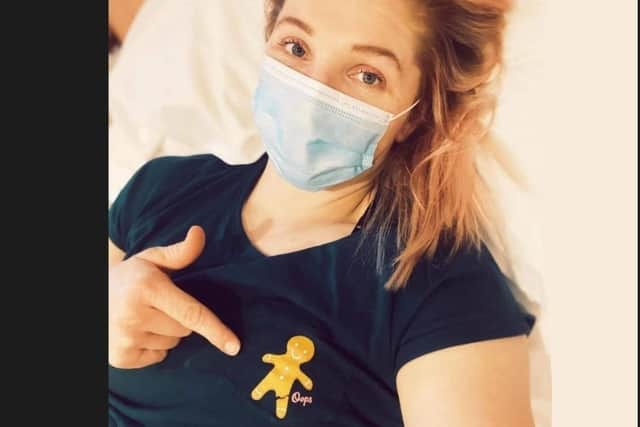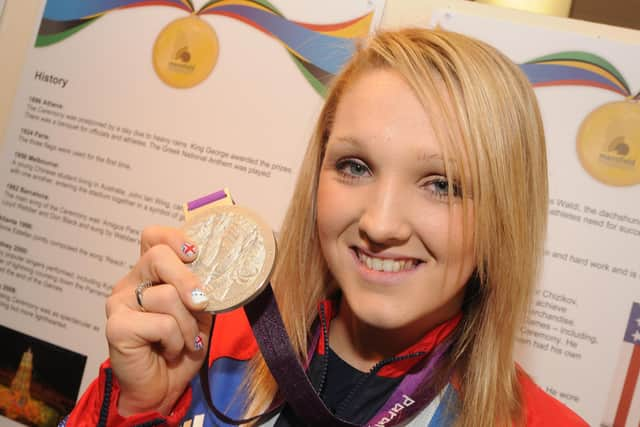Mansfield paralympic athlete's relief after endometriosis diagnosis ends years of worry
and live on Freeview channel 276
Charlotte Henshaw is currently recuperating at home after exploratory surgery finally diagnosed endometriosis earlier this month, and is now hoping to return to training in January to prepare for the 2021 Paralympics.
Endometriosis is a long-term condition where tissue similar to the lining of the womb starts to grow in other places, such as the ovaries and fallopian tubes. It affects women of any age and can have a significant impact on your life.
Advertisement
Hide AdAdvertisement
Hide AdAlthough believed to affect one in 10 women, endometriosis often goes undiagnosed for many years, as exploratory surgery is currently the only way to confirm the disease.


Charlotte explains: “I began with symptoms around seven years ago – the pain was excruciating at times and I could barely get out of bed some days.
"I visited my GP several times who diagnosed irritable bowel syndrome or severe menstrual cramps on a number of occasions, but I knew there was something else going on.
"They thought I had ovarian cysts at one point, but scans came back clear, so I was sent home and told to take painkillers.
Advertisement
Hide AdAdvertisement
Hide Ad"As we all do, I started fearing the worst case scenario as the symptoms got worse, but scans continued to show nothing.


"It was so frustrating being in pain all the time, and anxiety and frustration began to creep in at the unknown.”
With a recent focus on female athlete’s health, Charlotte began tracking her menstrual cycle when it was discovered that hormonal changes affected female athlete’s training, and it was then she began noticing a pattern to her pain.
For the 33-year-old, ovulation was an extremely painful time which often left her bedridden, as the adhesions swell and twist her internal organs.
Advertisement
Hide AdAdvertisement
Hide AdAs her condition worsened, Charlotte’s anxiety increased, so she admits that her diagnosis is actually a relief – despite the long-term implications – and hopes her story can help others.


She hopes that more woman can take control of their health by tracking their cycles and being able to produce evidence to their doctors to speed up the diagnosis.
"I spent years in pain, and it was only when I tracked my cycles and saw the pattern that I could finally push for more to be done” she continued.
"The disease needs more research and women need to feel like they are being listened to.
Advertisement
Hide AdAdvertisement
Hide Ad"You know your body and you know when something is wrong, it’s unfair that we can suffer for years before diagnosis.
"There are plenty of apps where you can track your cycle, which can really help when seeking medical advice.”
She also believes women need to empower themselves, and that speaking out about their menstrual cycle should become the norm, rather than something to be ashamed of.
She added: “Women often suffer in silence because they are embarrassed to speak to their doctor.
Advertisement
Hide AdAdvertisement
Hide Ad"They will put off seeking medical advice, especially if their GP is male, but it should just be as easy to speak about as anything else.
"You need to advocate for yourself and your health.”
She also believes ‘more needs to be done’ for sufferers as there is no cure, and only minimal treatments available to manage symptoms.
Extensive surgery is available to remove the adhesions, however these can often return and, in some cases, causes internal organs to stick together causing further complications.
She explains: "It’s awful that the only way to be diagnosed is invasive surgery – more needs to be done to aid diagnosis.
Advertisement
Hide AdAdvertisement
Hide Ad"Nothing shows up on scans at all, no blood test can detect it, they need to research the condition more to stop women having to suffer for years.”
Charlotte is hoping to manage her condition during 2021 to allow her to compete in competitions later in the year before needing extensive surgery to improve her symptoms long-term.
The athlete’s seven year wait for a diagnosis is, unfortunately, not an isolated case.
Urgent improvement in care for endometriosis sufferers across the UK is needed and diagnosis times need to be cut in half, a report by MPs said earlier this year.
Advertisement
Hide AdAdvertisement
Hide AdAn inquiry by the All-Party Parliamentary Group (APPG) on the condition found that a diagnosis takes eight years on average - and this figure has not improved in more than a decade.
More than 10,000 people were surveyed as part of the APPG inquiry, along with healthcare professionals, with findings showing that a shocking 58 per cent visited their GP more than 10 times before being diagnosed.
A total of 90 per cent of people also said they would have liked access to psychological support, but were never offered it, with 81 per cent saying the condition had impacted their mental health either negatively, or very negatively.
The report also found that 35 per cent said that they had a reduced income due to endometriosis.
Advertisement
Hide AdAdvertisement
Hide AdThe symptoms of endometriosis can vary – some women are badly affected, while others might not have any noticeable symptoms.
The main symptoms are: pain in your lower tummy or back (pelvic pain) – usually worse during your period, period pain that stops you doing your normal activities, pain during or after sex, feeling sick, constipation, diarrhoea, blood in your pee during your period, and difficulty getting pregnant.
You may also have extreme heavy periods and may bleed through your clothes.
For more information, check out the NHS website at www.nhs.uk/conditions/endometriosis/.